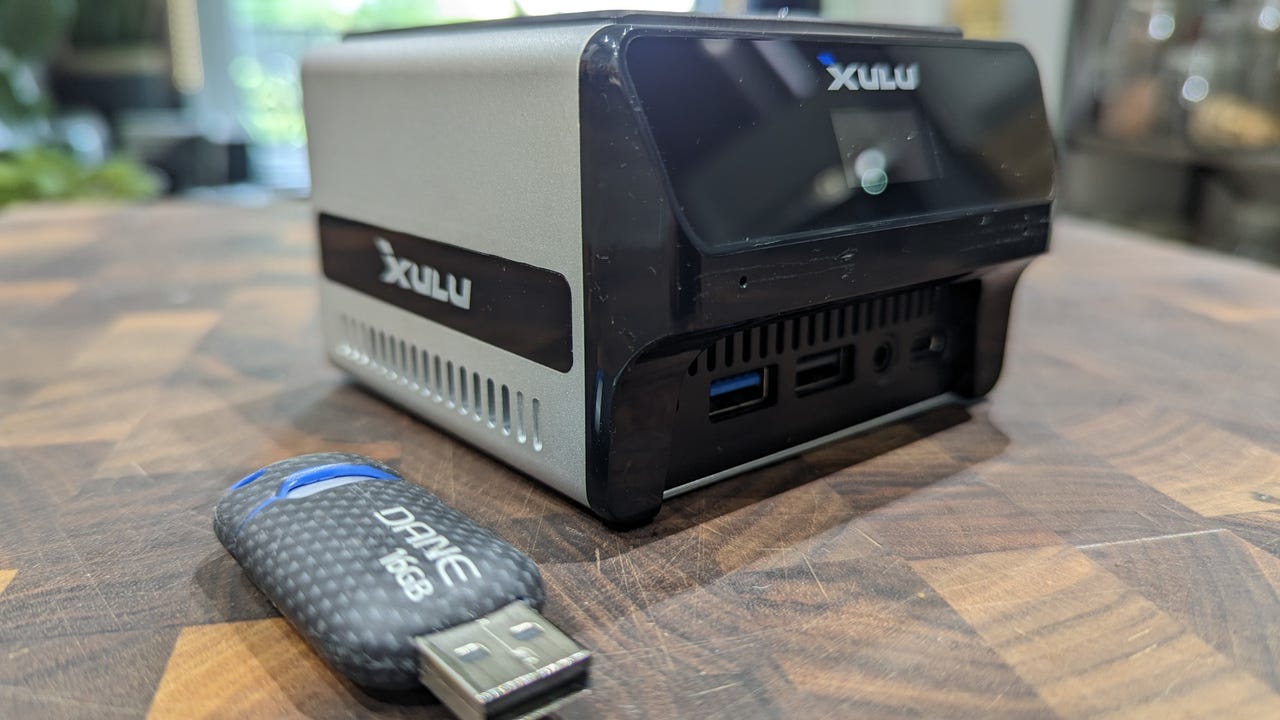This tiny PC punches way above its weight, and it’s cheaper than you think

The Xulu XR1 Pro with a standard USB flash drive for scale. Jack Wallen/ZDNET
Nano PCs are a very important piece of the technology puzzle. You might have a desk with very limited space. Or maybe you want to create a kiosk where you need to tuck the computer away from sight. You might even want to have a “community” PC in your home (or maybe your Airbnb), where guests can get online and do what they need to do.
Also: The best all-in-one computers: Mac, HP, and more compared
No matter the need, these tiny PCs are here to serve. I've used many small form factor PCs and most of what I've used pales in comparison to the Xulu XR1 Pro. This device is not only the smallest of the tiny PCs I've tried, but it's also the most powerful.
The device itself measures a scant 3.5 x 3.5 inches and is only 2.5 inches tall, making it the smallest AMD Ryzen 7-powered PC ever built. Yes, it's tiny. But it also offers six USB ports, one USB Type C port, two HDMI ports, and a headphone jack.
The specs
Of course, you're probably wondering what the full specs are. Here's the list:
- CPU: AMD Ryzen 7 8 cores/16 threads.
- GPU: Radeon 8.
- Speak/mic jack combo with built-in dual mics.
- RAM: Up to 64 GB (mine has 16 GB), which is upgradeable.
- Storage: Up to 2 TB M.2 SSD (mine has 512 GB), which is also upgradeable.
- Large-volume turbine fan.
- OLED status display.
- Connectivity: Wi-Fi 6e, gigabit ethernet, and Bluetooth 5.2.
- HDMI cable and power cable are included.
My Xulu XR1 shipped with Windows 7, but the hardware also supports Linux, so you can install any distribution you want. My normal inclination would be to immediately install Linux, but I opted to see how well the machine would power a resource hog like Windows 11.
There are plenty of ports on the back side (with more on the front). Jack Wallen/ZDNET
I was pleasantly surprised. I expected the Xulu XR1 Pro to struggle under the weight of Windows 11, but it turns out the machine has plenty of power to do just that. Even though I'm not a fan of the Windows OS, I was impressed at how well the OS performed on such a small unit. I'm used to how well Linux runs on small form factor PCs, but my Windows experience with these machines tends to veer toward the disappointing.
Also: This sub-$400 mini PC is powerful enough to connect 3 monitors
So, imagine how well the XR1 would perform with Ubuntu or Linux Mint. My goal was to test that theory, so I inserted a USB drive with Ubuntu Budgie, entered the boot menu, selected the USB drive as the primary boot device, and booted into Ubuntu Budgie. The result was that the Xulu XR1 Pro performed almost as well as my regular desktop PC, a System76 Thelio. My primary desktop did have the advantage of 32 GB of RAM, so it wasn't exactly an apples-to-apples comparison. Even so, the XR1 Pro did a remarkable job running a live version of Linux.
This tiny machine is ideal for work, entertainment, school, or even some gaming. The best thing about these tiny form factor PCs is that they can be installed anywhere. And even though the XR1 Pro does have a large-volume fan, I never heard it running. I could feel it spinning and moving air, but the sound was so minimal I had to get very close to hear the fan.
Also: The best computers: Comparing laptops, PCs, and more
As far as price is concerned, the Xulu XR1 Pro will start at around $299 and max out at around $399. So not only does this tiny machine punch above its weight, but it's also at a price point that makes it even more appealing. Having an AMD Ryzen 7 desktop machine at that price is a bargain…no matter the size.
Although I don't expect tiny form factor PCs will ever supplant the standard desktop or laptop market, these small devices certainly serve a number of purposes and do so very well.

